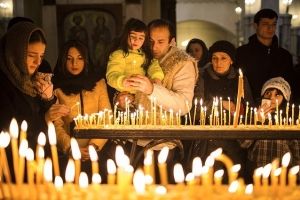New Year in Georgia: More Celebrations to Come
Most expats are still recovering from their Thanksgivings and Christmas Days, and the whole world has celebrated (albeit with limits and covid-caution) New Year. But here in Georgia, the celebration has only just begun. Most workers and students are off for at least another week, some another two, as we have January 7, Georgian Christmas, with the end of the long winter fast, then the lesser-celebrated "Old New Year" still to look forward to.
Members of the Georgian Orthodox Church, together with part of the Orthodox world, celebrate Christmas on January 7, according to the Gregorian calendar. This usually means crowds packed into churches countrywide from at least 11pm on January 6 until early morning, to welcome the birth of Christ. We're waiting to hear from the government and Church as to the restrictions that will be put in place due to the ongoing pandemic lockdown. After Church, people traditionally head home to "break the fast" and feast and drink till they drop. The fast forbids dairy products, meat, and alcohol, so this is really a chance for the devoted to let their hair down and open up a few notches on their belts.
Late morning on January 7, hundreds of people from different regions of Georgia usually join the Tbilisi Christmas march, called 'Alilo'. It runs from Republic Square, along Rustaveli Avenue to Freedom Square, and then acrosss the Baratashvili Bridge and up to the Sameba Cathedral, where marchers are met by the Patriarch. Again, it's unlikely such a large gathering will be permitted this year, nor has an announcement yet been made as to any possible distanced version. While marching, participants (children and church members) sing and gather gifts and sweets, which are then given to the children and vulnerable.
Fast forward through a week of visiting friends and family for more feasting and drinking, and you have the last day of the celebrations- Old New Year, which is the equivalent of the New Year according to the Gregorian calendar followed by the Orthodox Church. As a point of interest, other countries which follow this tradition along with Georgia are: Ukraine, Armenia, Belarus, Azerbaijan,Palestine, Jordan, Uzbekistan, Bosnia and Herzegovina (mostly in Republika Srpska), Kazakhstan, Montenegro, Moldova, Wales and Switzerland.
This is the last day a New Year feast table is laid for family, and boasts all the delicious traditional dishes seen before it, although some families offer a rather more modest fare and only get out the sweets and wine. It is not an official holiday, and so the meeting usually takes place in the evening for those already back at work. You'll know about it even if you don't celebrate, because you'll see (or hear) almost as many fireworks being set off as you did on January 1.
After this, decorations are packed away for the year. All except the chichilaki,a Georgian traditional Christmas tree made from dried hazelnut or walnut branches that are shaved to form a small tree which resembles Cousin It from the Addams Family. Most poular in Western Georgia, chichilakican also be found at the markets and in some stores in Tbilisi.
Georgians decorate their chichilaki with berries, dried fruits and churchkhela in hopes of a bountiful harvest and a better future. To make sure of this, these beautiful trees are then burned on the night prior to Epiphany on January 19 tosymbolize the end of the previous year's troubles. And as we have all had a lot of troubles, perhaps we should all be investing in this little gem of Georgian tradition this year!
03 January 2021 15:05
